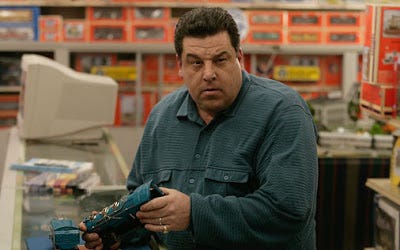
“Blue Comet” is one of the most depressing episodes of television ever created, a perfect collision of rapid, chaotic decline and long-term, wide-reaching existential hopelessness. It amounts to fifty-one straight minutes of yelling “no” in response to the questions will this man be redeemed? and will this man live through this?. It’s also, at the same time and often in the same breath, one of the funniest episodes of television ever created, an domino-effect sequence of hilariously, relentlessly stupid unforced errors.
The end of Tony’s time in therapy should be devastating — it literally closes the door on the possibility of him finding a way to become better — and it is, but it’s also absurd. The evidence that he’s a sociopath (the fake crying, the surface-level engagement with deep wounds) aren’t insignificant here, but Melfi breaking up with him is as much an admission that she can’t help him as it is that all his little acts of bullshit have reached an untenable critical mass. The magazine page, the invasive question about money, the claim that she only has to work because she’s divorced, the accusations that she sounds like his wife, that she’s menopausal, that she’s immoral — all of these are indicators of how little empathy he’s capable of, how he’s unwilling to see others as actual people in their own right, how that unwillingness makes it easy for him to engage his reflex to wound others’ egos to defend his own. In balancing existential significance with ridiculous pettiness, the dissolution of their relationship ties a perfect bow on the story of a man who’s blown every possible shot at redemption, even the easy layup of just not being an asshole every so often.
Immediately after Melfi cuts Tony loose, the hit on not-Phil and not-Phil’s mistress closes the door on the question of will this man live through this. Tipped off by Agent Harris in yet another act of criminal-cop symbiosis, Tony calls a preemptive strike against Phil, who’s planning to “decapitate and do business with what’s left” in order to solve the problem of New Jersey. Tony’s willingness to sacrifice another person — especially someone he hates — to save himself is unsurprising, and even if the sacrifice had been executed correctly, it probably wouldn’t have done much more than buy him a little bit of extra time. But fumbled as badly as it was, it brings the axe down onto everyone.
Not immediately, though, and the Sopranos, in true Soprano fashion, manage to get some last-minute interpersonal fuckups in before it all comes tumbling down. Tony and Carmela’s conversation with the Buccos about Meadow’s new relationship and career pivot reaches new heights of cringe and reveals the depths of their parental disappointment in the process. Tony blurts out that Meadow dropping pre-med a relief because of “AIDS and all that” is mortifying; Carmela trying to recover with a more respectable explanation about malpractice lawsuits and declining salaries is only a little bit less so.
And Janice fits in yet another moment of whatever the opposite of sibling bonding is when she asks Tony for money to help care for Junior — the ghost of long, drawn-out decline hovering at the edges of this impending drive off a cliff; the exception to Tony’s assertion that the only end for someone in their line of business is “dead or in the can.” On the one hand, not a great look for Tony to withhold material care from his family; on the other, an even worse one for Janice to ask her brother to support a man who plotted to have him killed and later shot him. There are no winners here.
There are even fewer winners in the moments that follow. Right after Janice departs, Silvio comes to the pool with a brusque “Tone, bad news.” It’s always bad news by the pool — the ducks loaded with symbolism, the pivotal moments in Tony and Carm’s dissolution and reunion, AJ’s attempted suicide — and the way the series weights down this distinctive signifier of sunny American upper-middle-class notions of success with more and more dread as it wears on is one of my favorite subtle threads.
The wheels come off at warp speed after that brief conversation: Bobby is killed, Sil is severely injured, Tony is in hiding after yet again alienating his son. But even that ruthless efficiency is riddled with errors on both sides. Bobby leaves his cell phone in his car, missing the call that would have tipped him off to the hitmen tracking him to the train shop. Silvio narrowly misses his window to escape and ends up riddled with bullets in the parking lot of the Bing (as an aside, the crowd of employees watching everything unfold? very funny!); in the chaos that follows, a bystander motorcyclist gets hit by a fleeing car.
It feels a little absurd, all these dumb, avoidable errors proving pivotal within the grand existential scheme of this story. But it’s always the little things that trip us up — the tiny slights that sever ties that have been worn thin by more traumatic dynamics, the petty disagreements that function as microcosms for broader and longer conflicts, the forgotten simple details that sabotage the elaborate plans we’ve been building for years.
